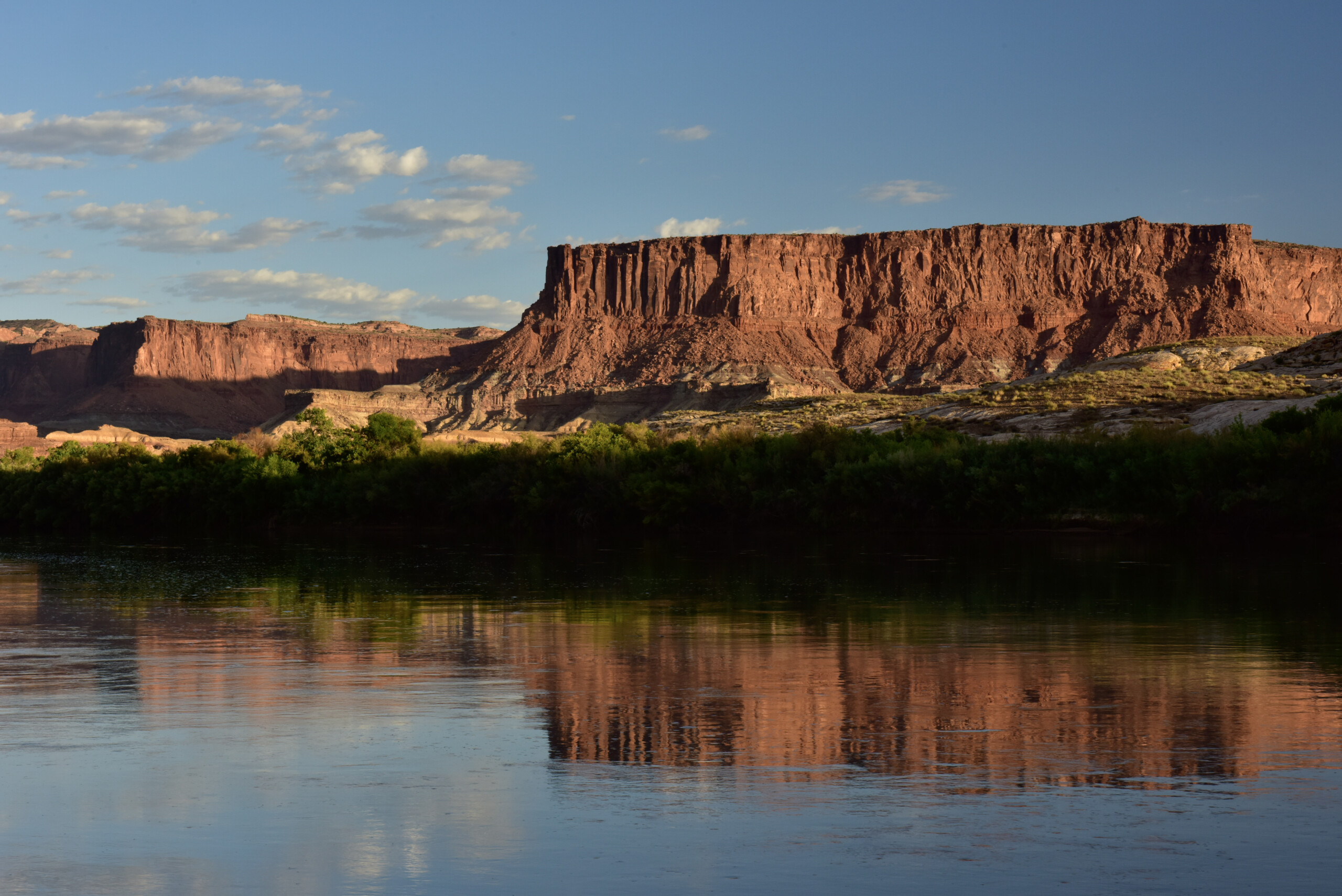The lawsuit asks important questions about regulating deep groundwater drilling along the banks of a major river. As companies push to meet the demands of the green energy transition, the effort ensures accountability for our communities — plant, animal and human.
Green River, UT — A coalition of water users, businesses and NGOs filed a lawsuit Tuesday evening in Utah’s Seventh Judicial District Court, seeking to overturn a water permit given to an Australian mining company that wants to extract lithium from groundwater in Green River.
Living Rivers and Great Basin Water Network have been working with community members in Green River for more than a year to ensure that groundwater, surface water, ecosystems, farms, and residents face no harms imposed by Anson Resource’s project proposed for the banks of the Green River.
The coalition’s filing targets a recent decision by the Utah State Engineer to approve a water rights application for the novel lithium mining operation along the Colorado River’s largest tributary. State Engineer Teresa Wilhelmsen’s September approval of the water permit followed more than 14 months of regulatory disputes between the coalition, regulators and Blackstone Minerals, a subsidiary of Anson.
Blackstone’s filing with the Division of Water Rights was the first major push for water rights associated with lithium mining in the beleaguered Colorado River system and arrived while companies throughout the western U.S. look to extract the element in arid regions.
The lawsuit seeks to ensure that regulators are upholding statutory tenets as companies seek to bring projects online as quickly as possible.
“The recent decision from the State Engineer gives a foreign-backed company a free pass from Utah regulators to turn Green River into an energy colony,” said John Weisheit, conservation director of Living Rivers. “The courts must consider the arbitrary and capricious nature of the State Engineer’s decision.”
“What happens in Green River will have a ripple effect across Utah, putting deep underground water supplies in the crosshairs of companies throughout the world,” said Kyle Roerink, executive director of the Great Basin Water Network. “The Green Energy transition cannot be a gold rush that impacts any water body in the Colorado River Basin. This important action ensures we get the best decisions possible for local communities targeted by companies looking to make a fast buck.”
“This proposed lithium extraction site will be mere feet from my front yard and the river,” said Gayna Salinas, a farmer in Green River. “We are not assured that the State Engineer’s decision follows the letter of the law. This lawsuit is an important next step for the people and resources of Green River to ensure accountability.”
“The Green River and the Colorado River System deserve the highest standards of review when it comes to granting large-scale industrial projects touting unproven technology and results,” said Lauren Wood, Trip Director with Holiday River Expeditions. “Our coalition’s effort is about getting something we don’t often see in the waterways of the west: accountability.”
BACKGROUND
Anson’s lithium project requires the use of billions of gallons of water — highlighting an emerging debate about the impact of the company’s drilling and pumping brine 10,000 feet below the earth’s crust.
Blackstone Minerals’ application for nearly 14,000 acre feet is a non-consumptive appropriation. But that doesn’t mean there won’t be challenges.
The nation’s only fully operational lithium mine in Nevada evaporates water to extract the element — consumptively using water in the desert. But now emerging techniques to extract lithium from deep brines in arid regions claim to be non-consumptive, or less consumptive, because the water will be reinjected after extraction. Anson plans to take this approach.
However, while companies tout this non-consumptive technology known as Direct Lithium Extraction, the method is unproven at scale anywhere on the planet. Non-consumptive appropriations of deep brine groundwater can still lead to impacts on surface waters and surface water expressions of groundwater.
Lithium mining inherently requires freshwater for processing and, research suggests, consumptive uses of water. And, in the case of Anson/Blackstone, the company has cut deals to lease 2,500 annual acre feet of freshwater from the river for its project — a move that the company doesn’t mention publicly. The freshwater for processing is separate from the need for brines.
Regardless, brines are a part of aquifer systems.
An article published in the journal Nature Reviews Earth and Environment in March 2023 argues that brine water “must be considered” a water source because of aquifer characteristics where brine and freshwater mingle.
Anson/Blackstone argues that the brines in deep aquifers have no connectivity with freshwater. We disagree. And this is why we are concerned about how regulators will address issues of connectivity and availability.
The approval of the Anson water right means that companies can go into over-allocated basins and pump deep brine without much consideration for other water rights and freshwater supplies underground or connected with surface water — if they promise to do no harm.
Additionally, the company will be drilling through a radioactive aquifer contaminated by a uranium mill that is now managed by the Department of Energy as a Legacy Management Site.
This is among the many public welfare questions that loom in addition to the concerns about how the company will compensate the people of Utah for tapping into the state’s mineral wealth before having royalty agreements in place with the state.
Kyle Roerink
Great Basin Water Network
702-324-9662
kyleroerink@greatbasinwater.
John Weisheit
Living Rivers
435-260-2590

